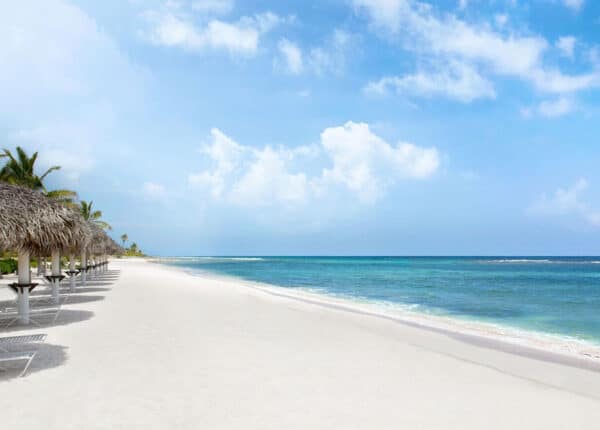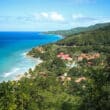Vanderpool-Wallace: The Missing Link For Tourism in the Caribbean
By Vincent Vanderpool-Wallace
CJ Contributor
TOURISM MINISTERS and Commissioners and their counterparts in the private sector in the Caribbean have come to see that the region’s tourism industry is vastly underperforming compared to the potential that they see.
Hotel occupancies across the region average 60 percent annually and tourism represents some 15 percent of regional GDP. In some Caribbean countries, the tourism contribution to GDP is as high as 80 percent. It does not take much arithmetic to see that if occupancies could be advanced to 90 percent, the tourism contribution could be increased by some 50 percent.
Some believe that such occupancies are impossible until they recognize that cruise ships coming into the region regularly exceed 100 percent occupancies. Thankfully, everywhere we look, cruise lines are becoming more completely integrated into the delivery of value to the region. In addition to the evidence that cruise ships bring people who sample the experiences in the region for later land-based stays, it is now clear to all that they also deliver incremental revenues to specific pockets of the tourism economy that would not receive those revenues if those cruise ships did not exist.
But most of all, governments in the region recognize that tourism promises to deliver the fastest results to the region of all initiatives and, of greatest importance, tourism is probably the one economic sector for which there is no such thing as a “jobless recovery.”
There is no one within the region who does not believe in the value of economic diversification. But while awaiting the development of those diversifying industries, there are fewer and fewer people who believe that the Caribbean should not take full advantage of the global comparative and competitive advantage that it possesses in tourism.
It is now clear that Tourism Ministers and Commissioners have become persuaded that regional cooperation and collaboration in tourism makes much more sense than the traditional internecine rivalries that attends many international discussions in the region. It has often been said that the Caribbean exists only at Caribbean conferences and is immediately forgotten when participants arrive back in their homeland. The development of tourism in the Caribbean is becoming the exception.
But while the world was busy removing barriers to the movement of good across borders, many countries went in the opposite direction with respect to the movement of people across borders. There has been a veritable explosion of increases in departure taxes, air passenger duties (APD), security fees and passenger facility charges (pfc’s).
Last month, Chad Meyerson, the global sales director at JetBlue Airlines, in response to a question from Caribbean Journal regarding the biggest challenge facing JetBlue in the Caribbean noted: “taxes are a very serious issue. Quite often the price of a ticket (the amount received by the airline) is less than the tax on the flight to the island even though it is a one hour flight. . . . The traveler can get more for the money going somewhere else.”
In some places, for example, in the United States of America, the principle of free interstate trade is enshrined in the constitution. Imagine what commerce would be like in the United States if every time a product or person crossed into another state there was a tax applied at the border. There is no doubt that it would be a devastating damper on interstate commerce.
It is also axiomatic that under those conditions the greatest fall off in business for any state would come from border states. It is an axiom in travel, especially in leisure travel that more visitors come from nearby destinations as compared to those from farther away. It is also arithmetic that when fixed costs are added to air and sea tickets, the shorter the distance, the higher the proportion of the total ticket cost that is represented by the tax. Unsurprisingly, it is for that reason that fixed taxes and growing taxes tend to dampen demand for short trips more than for longer journeys. So the very trips that we should be stimulating in the Caribbean, we have been discouraging inadvertently.
So, is there any wonder that at Caribbean conference after Caribbean conference, there is complete consensus that the largest untapped market for Caribbean tourism growth is the Caribbean itself? Somehow, we feel better about ourselves the farther the distance people travel to get to the Caribbean when in fact, the largest untapped market is all around us. It is us. It seems that many are doomed to become deeply depressed every other year with the pronouncements in the press about the imminent death of CARICOM as was reported again recently.
Could it be that one of the difficulties of CARICOM is that it plays hopscotch in the Caribbean? To continue the analogy with the United States of America, if Florida had trade agreements with Maine and New York but none with Georgia and Alabama, states on its border, could that agreement be as productive? Could it be that CARICOM which is largely defined by former colonies of Great Britain, should focus on contiguity instead of history?
Two Stimulating Solutions
Where should we begin to address this problem? Caribbean leaders should agree to a formula that allows for the rapid removal of all travel taxes and visas for persons traveling within the region. It is entirely possible to provide compensation for those who lose the most but with a formula for weaning them off the compensation subsidy eventually out of the significant GDP benefits that will surely flow their way as is found in the United States. In one destination, it has been shown that all of the taxes removed from airline tickets could be replaced by taxes collected on an increase of 8 percentage points of hotel occupancy alone. It would be much less once the induced and indirect effects of increased occupancies are taken into the effect.
As JetBlue’s Meyerson mentioned, many travelers in the Caribbean region do not realize that, in many cases, nearly half of the price of their tickets goes to government taxes instead of going to the airlines.
Until recently, many Ministers of Finance faced the “bird in the hand problem.” There was an absence of hard data to show that the benefits of removal of these taxes exceed the lost revenues. That absence of evidence has been eliminated by the recently completed PriceWaterHouseCoopers study on the effects of the Airline Passenger Duty (APD) on the economy of the United Kingdom. Besides the clear negative effects on travel to the Caribbean, the study showed that the removal of that APD would result in a $788 million net gain in UK taxes in the first year. Its removal would pay for itself.
In addition, the Caribbean should create a single Caribbean airspace to facilitate the development of air transportation. With prices lower and the elimination of red tape, the private sector will jump into the fray to create the long awaited highways in the sky that are now missing on scores of intra Caribbean routes. What the Caribbean desperately needs is not more asphalt roads ON islands but lower cost, air bridges BETWEEN countries. What is more, such an action will surely make many airlines less dependent on, if not take them completely off, the public trough.
The next step for the Caribbean is to free its largest export, travel and tourism, from all internal barriers, even as it becomes the global model of successful regional coordination and cooperation between the public and private sectors in tourism. Reducing the cost of the Caribbean’s biggest export will surely stimulate a “jobful” recovery that our region so badly needs in its most important and most easily stimulated economic sector.
It will become our version of “NAFTA”. The next steps might focus on negotiations of the reciprocal elimination of departure and other taxes between the Caribbean region and its major source markets. The Caribbean can become the example for the United Nations World Tourism Organization (UNWTO) and the World Travel and Tourism Council (WTTC) to take to the world.
Imagine Caribbeans and visitors to the Caribbean traveling easily, frequently and less expensively across our diverse array of languages, cultures and lands, successfully living and loving the Caribbean life.
In principle, but not in name, a most hopeful view of the future: the United States of the Caribbean.
Vincent Vanderpool-Wallace is the former Tourism Minister of the Bahamas and Secretary General of the Caribbean Tourism Organization. He was named one of the 50 most influential people in Caribbean tourism in the last 50 years by Fast Company magazine. He is graduate of Harvard University and the University of Miami.







